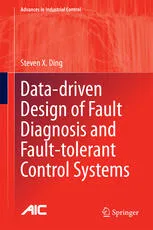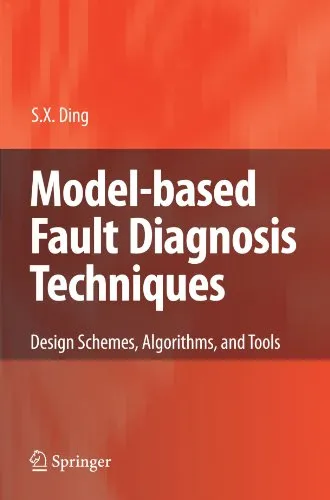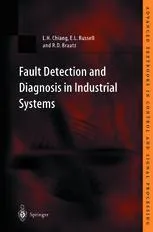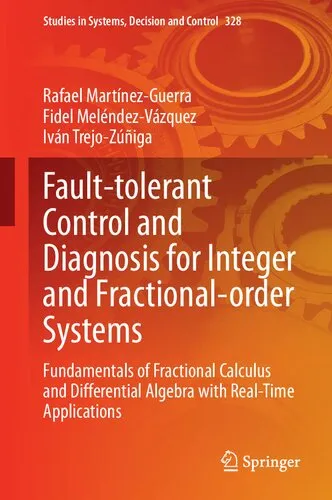Data-driven Design of Fault Diagnosis and Fault-tolerant Control Systems
4.5
Reviews from our users

You Can Ask your questions from this book's AI after Login
Each download or ask from book AI costs 2 points. To earn more free points, please visit the Points Guide Page and complete some valuable actions.Related Refrences:
Introduction to "Data-driven Design of Fault Diagnosis and Fault-tolerant Control Systems"
"Data-driven Design of Fault Diagnosis and Fault-tolerant Control Systems" dives deep into the intricate and dynamic interplay of fault diagnosis and fault-tolerant control techniques within the field of modern systems engineering. Authored by Steven X. Ding, this book addresses the growing demand for robust, reliable, and intelligent control systems capable of maintaining performance despite faults and uncertainties. Combining rigorous theoretical frameworks with practical insights, this work serves as an authoritative guide for researchers, engineers, and professionals working in automation, control systems, and data science.
Detailed Summary of the Book
With technological systems becoming increasingly complex, ensuring their safe, reliable, and fault-resistant operation is paramount. "Data-driven Design of Fault Diagnosis and Fault-tolerant Control Systems" offers a comprehensive framework for addressing this challenge. The author leverages principles of data analytics, machine learning, and control theory to introduce methods for diagnosing faults in real-time and designing fault-tolerant control systems for industrial and real-world applications.
The book begins with an overview of fault detection, diagnosis, and tolerance within automated processes. It then delves into data-driven approaches, highlighting how sensor data and system logs can be harnessed to provide actionable insights. Throughout the book, detailed mathematical and statistical tools are explained with clarity, covering topics like residual generation, observer design, and fault prognosis.
A unique feature of this book is its emphasis on fusing model-based and data-driven methods. Rather than relying solely on pre-defined models, the author demonstrates how systems can benefit from adaptive and flexible solutions powered by data streams and machine learning. Practical case studies and simulation examples are woven into the narrative to contextualize theoretical findings, making the concepts accessible and applicable.
By the end of the book, readers will have an in-depth understanding of designing control systems that demonstrate robustness and resilience, ensuring smooth operation even in the presence of unexpected faults or external disturbances.
Key Takeaways
When reading "Data-driven Design of Fault Diagnosis and Fault-tolerant Control Systems", you'll gain valuable insights, including:
- An introduction to data-driven fault diagnosis methodologies and their applications in real-time monitoring.
- Theoretical and practical techniques for residual evaluation and thresholding to detect faults.
- Fusion of model-based and data-driven approaches for enhanced fault tolerance.
- Insights into artificial intelligence and machine learning techniques for fault prognosis.
- Hands-on examples and case studies to bridge the gap between theory and implementation.
Famous Quotes from the Book
This book is peppered with insights that encompass the essence of fault diagnosis and control system design. Here are a few standout quotes:
"A fault-tolerant system is not one that operates in the absence of problems but one that continues to function intelligently when issues arise."
"Data is more than a byproduct of operation; it is the cornerstone for building resilient systems."
"The roadmap to a reliable automated system lies in the synergy between theoretical frameworks and practical data exploitation."
Why This Book Matters
The increasing automation of industrial, transportation, and critical infrastructure systems necessitates fault diagnosis and fault-tolerant control as foundational elements of design. Complex systems are prone to faults that can lead to severe downtime, loss of productivity, and even safety hazards. This book provides essential tools for mitigating such risks and ensuring safe, reliable, and efficient system operations.
Steven X. Ding's work addresses the limitations of traditional model-based fault diagnosis techniques by integrating them with data-driven approaches. By doing so, it caters to the emerging fields of machine learning and data science, which are shaping the future of automation. Readers from academia, industry, and research domains will find this comprehensive guide invaluable in equipping themselves with the skills needed to design and implement cutting-edge fault diagnosis and fault-tolerant systems.
Beyond the theoretical implications, the practical insights provided make this book a must-read for engineers striving to create smarter, more resilient infrastructure, especially as Industry 4.0 and IoT continue to reshape the global landscape.
Free Direct Download
You Can Download this book after Login
Accessing books through legal platforms and public libraries not only supports the rights of authors and publishers but also contributes to the sustainability of reading culture. Before downloading, please take a moment to consider these options.
Find this book on other platforms:
WorldCat helps you find books in libraries worldwide.
See ratings, reviews, and discussions on Goodreads.
Find and buy rare or used books on AbeBooks.
1190
بازدید4.5
امتیاز50
نظر98%
رضایتReviews:
4.5
Based on 0 users review
"کیفیت چاپ عالی بود، خیلی راضیام"





